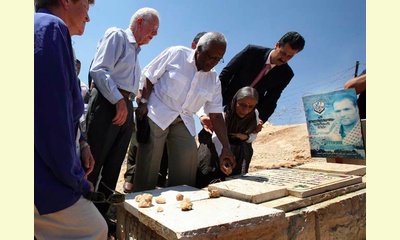|
|
Anti-Apartheid Archbishop Tutu Calls Presbyterians to Back Divestment From Israeli Occupation
un articulo por Robert Naiman, Truthout Op-Ed (abridged)
As Presbyterians meeting in Detroit consider divestment from three
companies linked to the Israeli occupation of Palestine - Caterpillar,
Motorola, and Hewlett Packard - Archbishop Desmond Tutu, the
leader who more than any other human being alive is associated
with the successful use of divestment to help overturn apartheid in
South Africa, is calling on Presbyterians to choose divestment from
the Israeli occupation. 
Retired Anglican Archbishop Desmond Tutu, center, placed a stone on a grave on Thursday, Aug. 27, 2009, in Bilin, site of weekly protests against the Israeli barrier that bisects the village. (Photo: Rina Castelnuovo / The New York Times)
click on photo to enlarge
Tutu received the Nobel Peace Prize in 1984 in recognition of his
leadership, as general secretary of the South African Council of
Churches, of the nonviolent resistance campaign to challenge
apartheid. . . Here's what Tutu is saying now about the prospect
of Presbyterian divestment from the Israeli occupation (my
emphasis):
"As the Presbyterian General Assembly gathers for its biennial
meeting, I reach out in prayer and solidarity that the assembly will
make a strong witness for reconciliation, justice and peace. I am
aware that the assembly will consider eight overtures on the
confounding and intractable conflict in Israel and Palestine,
however, I am especially urging the assembly to adopt the
overture naming Israel as an apartheid state through its domestic
policies and maintenance of the occupation and the overture calling
for divestment of certain companies that contribute to the
occupation of the Palestinian people. Both are worthy of
adoption, by speaking truth in the first instance, and owning up to
the church's complicity in maintaining the occupation through its
investments in the second."
"The sustainability of Israel as a homeland for the Jewish people has
always been dependent on its ability to deliver justice to the
Palestinians. I know firsthand that Israel has created an
apartheid reality within its borders and through its occupation.
The parallels to my own beloved South Africa are painfully stark
indeed. Realistic Israeli leaders have acknowledged that Israel
will either end its occupation through a one- or two-state solution,
or live in an apartheid state in perpetuity. The latter option is
unsustainable and an offense to justice. We learned in South
Africa that the only way to end apartheid peacefully was to force the
powerful to the table through economic pressure."
"The overtures proposed at the General Assembly are not about
delegitimizing the State of Israel, but about ending its suppression
of 4,000,000 Palestinian sisters and brothers. It's about naming an
unjust system and refusing to participate in it. The stubbornness
of Israel's leaders in wanting to hold onto and settling land that is
not theirs can only lead to tragedy for both peoples. For the sake
of them both as God's cherished, the strong witness of the two
overtures is the only peaceful route left in the cause of justice and
ultimate reconciliation. My prayers today are with the members of
the General Assembly and with all the peoples of the Holy Land in
Israel and Palestine."
|








|
DISCUSSION
Pregunta(s) relacionada(s) al artículo :
Israel/Palestine, is the situation like South Africa?, Would a Truth and Reconciliation Commission help?
* * * * *
Comentario más reciente:
The following discussion concerning the Presbyterian divestment from companies aiding the Israeli occupation of Palestine was received from The Tikkun Daily.
Editor’s Note from Rabbi Michael Lerner: We invited the Religious Action Center of the Reform Movement and J Street, both of which have opposed the Presbyterian divestment resolution, to respond to those who support the Presbyterian resolution. Neither agreed to do so. Tikkun has sought to be a safe space in which both sides could present their thinking. But it’s hard to get the two sides in the Jewish world to sit together and discuss the issues, since anyone who supports even the very limited form of divestment proposed by the Presbyterians is, as J Street’s Jeremy Ben Ami said recently in explaining his opposition to any form of Boycotts, Divestments or Sanctions, crossing “a red line” and hence, in the view of the Jewish establishment, automatically suspect of being anti-Semitic. We believe a public debate is a more healthy way to conduct this discussion, and so we are disappointed that neither J Street nor the Reform Movement accepted our invitation.
Presbyterian Divestment – A Jewish Perspective
by Cantor Michael Davis, Jewish Voice for Peace Rabbinical Council
The first time I wore a kippa and talit outside of a synagogue setting was four year ago outside a hotel in downtown Chicago overlooking the Chicago river. I was singing with a group of my colleagues, local Reform cantors, to protest the mistreatment of hotel workers. I had the privilege of getting to know worker leaders, edit a national clergy report into worker conditions and organize my fellow clergy in Chicago. This was an exciting time – we took over the lobby of a Hyatt hotel with a flashmob, met with senior executives, collaborated with Christian clergy, traveled to other cities and on and on. . ... continuación.

|
|









